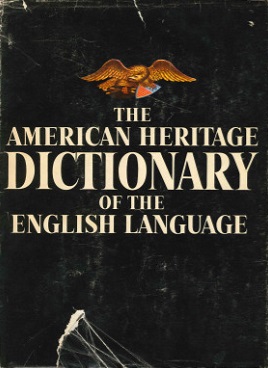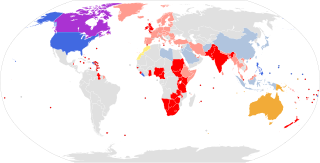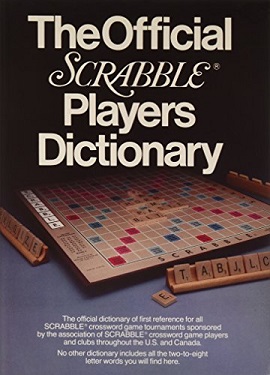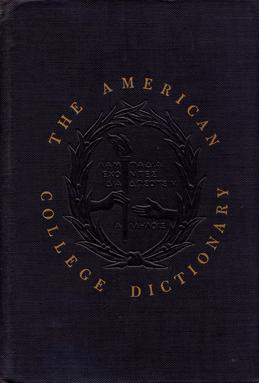Webster's Dictionary is any of the English language dictionaries edited in the early 19th century by Noah Webster (1758–1843), an American lexicographer, as well as numerous related or unrelated dictionaries that have adopted the Webster's name in his honor. "Webster's" has since become a genericized trademark in the United States for English dictionaries, and is widely used in dictionary titles.

Merriam-Webster, Incorporated is an American company that publishes reference books and is mostly known for its dictionaries. It is the oldest dictionary publisher in the United States.

The American Heritage Dictionary of the English Language (AHD) is a dictionary of American English published by Boston publisher Houghton Mifflin, the first edition of which appeared in 1969. Its creation was spurred by the controversy over the perceived permissiveness of the Webster's Third New International Dictionary. The third edition included over 350,000 entries and meanings.

The Macquarie Dictionary is a dictionary of Australian English. It is generally considered by universities and the legal profession to be the authoritative source on Australian English. It also pays considerable attention to New Zealand English. Originally it was a publishing project of Jacaranda Press, a Brisbane educational publisher, for which an editorial committee was formed, largely from the Linguistics department of Macquarie University in Sydney, Australia. It is now published by Macquarie Dictionary Publishers, an imprint of Pan Macmillan Australia Pty Ltd. In October 2007 it moved its editorial office from Macquarie University to the University of Sydney, and later to the Pan Macmillan offices in the Sydney central business district.

Webster's New World Dictionary of the American Language is an American dictionary published first in 1951 and since 2022 by HarperCollins Publishers.
The Imperial Dictionary of the English Language: A Complete Encyclopedic Lexicon, Literary, Scientific, and Technological, edited by Rev. John Ogilvie (1797–1867), was an expansion of the 1841 second edition of Noah Webster's American Dictionary. It was published by W. G. Blackie and Co. of Scotland, 1847–1850 in two large volumes.

A landaulet, also known as a landaulette, is a car body style where the rear passengers are covered by a convertible top. Often the driver is separated from the rear passengers by a division, as with a limousine.

Despite the various English dialects spoken from country to country and within different regions of the same country, there are only slight regional variations in English orthography, the two most notable variations being British and American spelling. Many of the differences between American and British/Commonwealth English date back to a time before spelling standards were developed. For instance, some spellings seen as "American" today were once commonly used in Britain, and some spellings seen as "British" were once commonly used in the United States.
Irregardless is a word sometimes used in place of regardless or irrespective, which has caused controversy since the early twentieth century, though the word appeared in print as early as 1795.

Webster's Third New International Dictionary of the English Language, Unabridged is an American English-language dictionary published in September 1961. It was edited by Philip Babcock Gove and a team of lexicographers who spent 757 editor-years and $3.5 million. The most recent printing has 2,816 pages, and as of 2005, it contained more than 476,000 vocabulary entries, 500,000 definitions, 140,000 etymologies, 200,000 verbal illustrations, 350,000 example sentences, 3,000 pictorial illustrations and an 18,000-word Addenda section.
A pronunciation respelling for English is a notation used to convey the pronunciation of words in the English language, which do not have a phonemic orthography.
NASPA Word List is the official word authority for tournament Scrabble in the USA and Canada under the aegis of NASPA Games. It is based on the Official Scrabble Players Dictionary (OSPD) with modifications to make it more suitable for tournament play. Its British and international-English counterpart is Collins Scrabble Words.

The Official Scrabble Players Dictionary or OSPD is a dictionary developed for use in the game Scrabble, by speakers of American and Canadian English.

The American College Dictionary was the first Random House dictionary and was later expanded to create the Random House Dictionary of the English Language. First published in 1947, The American College Dictionary was edited by Clarence Barnhart based on the 1927 New Century Dictionary.

Merriam-Webster's Words of the Year are words of the year lists published annually by the American dictionary-publishing company Merriam-Webster, Inc. The lists feature ten words from the English language. These word lists started in 2003 and have been published at the end of each year.
Twat is an English-language vulgarism which means the vulva or vagina, and is used figuratively as a derogatory epithet. In British English, and Irish English it is a common insult referring to an obnoxious or stupid person regardless of gender; in American English, it is rarer and usually used to insult a woman. In Britain and Ireland, the usual pronunciation rhymes with "hat", while Americans most often use the older pronunciation that rhymes with "squat". This is reflected in the former variant spelling of "twot".









